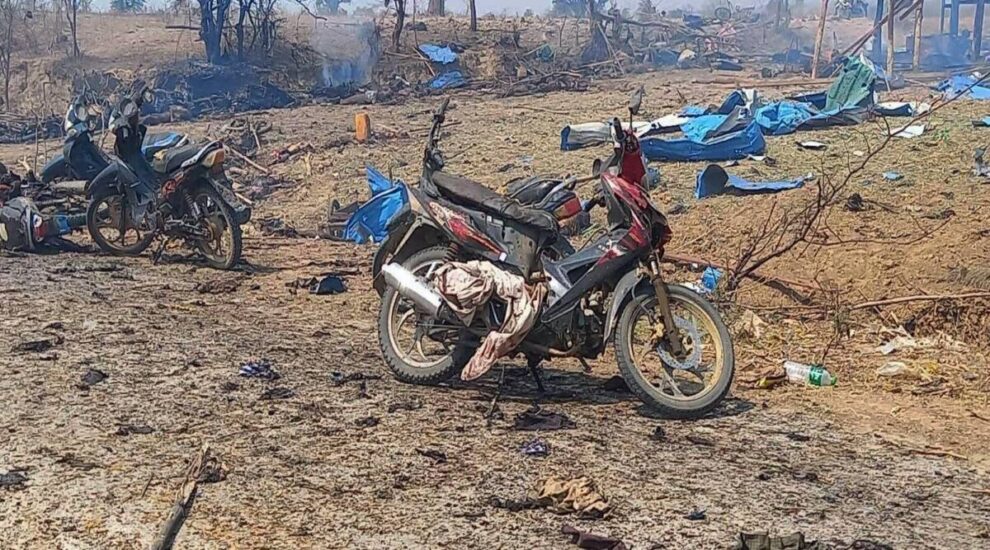As the junta steps up strikes on civilians, especially in Chin State, the United States must also ramp up its response.
War crimes are ongoing in western Myanmar as an increasingly desperate military junta continues an aerial bombardment of the region, relying on air power to target civilian populations. In April, one airstrike alone targeting a village in Sagaing Region killed at least 130 people, many of whom were women and children. Moreover, the civilian population of Chin State has endured 47 airstrikes carried out by the junta, killing at least 19 people and destroying multiple religious buildings and civilian homes in the month of April alone.
In the early hours of March 30, a small village located in Thantlang Township was bombed, killing at least 10 civilians, including four women and a 6-year-old child. The airstrike, carried out by the Burmese military, targeted a small village named Khuafo, approximately 10 kilometers north of Thantlang town, a once bustling hill-top town with a population of over 15,000 people. Today, Thantlang is deserted and in ruins, having been razed to the ground in late 2021 by the military junta.
These atrocities are part of an ongoing pattern as the military junta continues to intensify aerial bombardments in the region. Since the beginning of 2023, at least 138 bombs have been dropped on civilian areas in dozens of airstrikes across Chin State. The ongoing aerial campaign being carried out by the junta is in retribution for an ongoing civil and armed resistance to military rule.
Figures from 2022 confirm that, globally, Myanmar recorded the highest number of events of violence targeting civilians by state forces operating domestically. Myanmar saw two and a half times the number of such events as the second-highest country, Afghanistan.
The need for a more consolidated international effort is nowhere more urgent than in Chin State. Under an ongoing two-year siege by the junta, eight out of nine townships in the state are under martial law, a telecommunications blackout, and humanitarian aid blocking measures. The state has remained largely blockaded for two years by the junta, which controls the main access points; there has been no consistent aid reaching the population.
At the same time, violence has escalated in Chin State and other parts of western Burma. Extrajudicial killing, arbitrary detention, torture and killing of civilians, persecution of civil society, attacks on the civilian population, and deadly air strikes on civilian targets, including on schools and hospitals are all commonplace. This has led to approximately 25 percent of the population being displaced.
However, international support for the people enduring such circumstances has been woefully lacking. The buck has been well and truly passed onto the regional bloc, ASEAN, to convince the military junta to stop atrocities against its own people, engage in various forms of dialogue, and permit humanitarian assistance into the country.
Meanwhile, countries that tacitly prop up the military regime and shield it from the full weight of available international law are moving with purpose, seeking to divide resistance movements brokering peace talks with the junta and restricting supplies and arms from reaching pro-democracy resistance forces fighting the junta.
With the passing of the National Defense Authorization Act (NDAA) by the U.S. Congress in December, which embedded elements of the Burma Act, the United States has signaled its commitment to supporting the people’s struggle against military dictatorship. That commitment needs to be acted upon with haste, by supporting and strengthening pro-democracy resistance elements, increasing sanctions on the junta, and actively opening up aid routes. The United States should also prioritize forming a coalition with like-minded countries, especially working with states within the ASEAN bloc that have been vocal in opposition to the junta, in order to devise a platform for stronger action and move away from the flawed and ignored Five-Point Consensus.
The NDAA’s Burma Act requires the Department of State’s Office of Sanctions Coordination to develop a strategy for using the full range of United States diplomatic capabilities to implement Myanmar-related sanctions. While the United States has been the leading global power in the sanction designations targeting individuals and entities among the junta, there is a need to expand this to the regional level, specifically targeting those carrying out war crimes in Chin State.
The naming and designation of the light infantry battalions and commanders operating in the northwestern region will show the people who are enduring daily violations of human rights that their plight is categorically recognized on the international stage. It will also send a clear signal to the regional military leaders, who are responding to the fact that their control is waning with increased brutality, that they are not shielded by chain of command structures in Naypyidaw.
The most recent sanctions passed by the United States targeted the junta’s jet fuel supply chain, in recognition of the military regime’s “atrocities and violence against the people of Burma, with an increasing reliance on air strikes with unguided munitions and rockets in civilian populated areas.” This now needs to be expanded through a total ban on jet fuel sales to Myanmar, particularly in light of recent atrocities in Chin State.
When it comes to ensuring cross-border transport for aid, which must be delivered impartially and away from channels controlled by the junta, much of the focus has been placed on the Myanmar-Thailand border. However, Myanmar’s western border with India is also a specific problem. The current over-reliance on multilateral funding mechanisms administered through international organizations means that aid is failing to reach the most vulnerable segments of the population in the most urgent need, especially on the western border.
The Biden administration must act in haste to advance a Myanmar policy that can meaningfully address the ongoing crisis. Every day that such a response is delayed is another day of bloodshed and devastation for the millions of defenseless citizens suffering under the brutal military junta. Civilian protection should be at the forefront of this response. If the junta cannot fuel their jets, their ability to actively target civilian populations will be, at least in part, diminished.
The junta must be responded to using the language they understand: striking back with firm actions that hit them where it hurts.
Source: The Diplomat
















